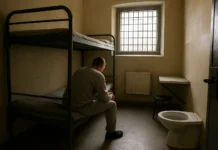The United Arab Emirates (UAE) is a nation in the Middle East comprising seven emirates, with Abu Dhabi as its capital and Dubai as its most prominent city. Known for its strict legal system, the UAE enforces discipline through fines, deportation, and, in Severe cases, imprisonment. What is daily life like inside UAE prisons? The prison system in the UAE integrates discipline, rehabilitation programs, and faith-based provisions to uphold both order and reform.
Life Inside UAE Prisons
- Facilities: Most prisons in the UAE are modern, air-conditioned, and monitored. Inmates are separated based on gender and security level.
- Basic Needs: Prisoners receive food, clothing, and healthcare. Family visits are allowed but closely supervised.
- Discipline: Rules are strict, with zero tolerance for drugs, contraband, or disruptive behavior.
Prisoner Rights and Privileges
- Religious Practices: During Ramadan and Eid, inmates receive special accommodations such as prayer spaces and adjusted schedules.
- Family Contact: Inmates can communicate with family through approved visits and monitored phone calls.
- Clemency: Each year, during Ramadan and national holidays, thousands of prisoners are granted early release, often with debts cleared by the government or private donors.
- Rehabilitation: Rehabilitation in the UAE focuses on education, vocational training, and counseling to help inmates reintegrate into society.
Challenges Reported
- Overcrowding: Some prisons, particularly in larger emirates such as Dubai, experience high inmate populations.
- Legal Concerns: International rights groups occasionally raise issues about prolonged detention, pretrial conditions, or treatment of foreign workers.
- Deportation after sentence: Many expatriates are deported after completing their sentences, limiting long-term rehabilitation opportunities.
Comparison Table: UAE vs. Other Countries
| Country | Conditions | Privileges | Rehabilitation | Overcrowding |
|---|---|---|---|---|
| UAE | Modern, air-conditioned, strict discipline | Religious observance, family visits, clemency releases | Vocational training, counseling | Moderate in big cities |
| Sweden | Open, rehabilitation-focused | Religious observance, family visits, and clemency releases | Strong emphasis on reintegration | Low |
| USA | Varies widely, some overcrowding | Access to education & work programs (not universal) | Moderate, varies by state | High in certain states |
| Philippines | Varies widely, with some overcrowding | Limited privileges, poor access to rehab | Weak rehabilitation systems | Severe |
Frequently Asked Questions (FAQs)
Are prisoners in the UAE separated based on nationality?
Yes, Inmates are usually separated by security level and gender, with expatriates making up a large share of the prison population.
Can prisoners practice religion freely?
Yes, religious practices are respected, especially during Islamic holy months.
How common are clemency releases?
Very common — Thousands of inmates are released each year, most often during Ramadan and on National Day.
Do prisoners in the UAE get rehabilitation programs?
Yes, vocational training, literacy programs, and counseling are available to support reintegration.
How do UAE prisons compare to Western systems?
They are stricter and less open than Scandinavian models, but generally more modern and orderly than overcrowded prisons in developing countries.
Is Dubai the same as the UAE?
No. Dubai is not the country itself but one of the seven emirates that form the UAE. The UAE is a country, and Dubai is a city-emirate within it.
- Sweden’s Prison Exodus: Why Stockholm Is Sending Inmates to Estonia—and What It Means
- Poland faces a Renewed Prison Overcrowding Crisis: Could Inmate Transfers Be Next?
- Top 10 Cultural Etiquette Rules to Follow in the UAE















